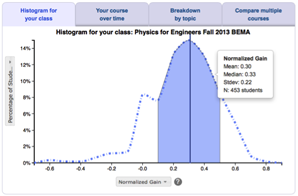Developed by Emily Marshman and Chandralekha Singh
| Purpose | Assess students’ conceptual understanding of the formalism and postulates of quantum mechanics rather than their mathematical skills. |
|---|---|
| Format | Pre/post, Multiple-choice |
| Duration | 50 min |
| Focus | Modern / Quantum Content knowledge (quantum mechanics formalism, quantum mechanics postulates) |
| Level | Graduate, Upper-level |
Sample questions from the QMFPS:


QMFPS Implementation and Troubleshooting Guide
Everything you need to know about implementing the QMFPS in your class.
Login or register to download the implementation guide.
more details
This is the second highest level of research validation, corresponding to at least 5 of the validation categories below.
Research Validation Summary
Based on Research Into:
- Student thinking
Studied Using:
- Student interviews
- Expert review
- Appropriate statistical analysis
Research Conducted:
- At multiple institutions
- By multiple research groups
- Peer-reviewed publication
The multiple-choice questions on the QMFPS were developed based on expert feedback about relevant topics, review of course materials and a subsequent test blueprint. The multiple-choice answers were developed based on research on student ideas about relevant quantum mechanics topics and the responses to a free-response version of the assessment that was given to students. The questions were tested with student interviews and revised. The QMFPS was then given to over 350 undergraduate and graduate students from 6 institutions, and appropriate statistical analysis of reliability, difficulty and discrimination were performed. Reasonable results were found. The results from the QMFPS have been published in one dissertation.
References
- M. Brundage, Investigating and Improving Student Understanding of Mechanics, Electricity and Magnetism, Quantum Mechanics, and Thermodynamics using Conceptual Surveys, Ph.D. Dissertation, University of Pittsburgh, 2024.
- E. Marshman, Improving the Quantum Mechanics Content Knowledge and Pedagogical Content Knowledge of Physics Graduate Students, University of Pittsburgh, 2015.
- E. Marshman and C. Singh, Validation and administration of a conceptual survey on the formalism and postulates of quantum mechanics, Phys. Rev. Phys. Educ. Res. 15 (2), 020128 (2019).
PhysPort provides translations of assessments as a service to our users, but does not endorse the accuracy or validity of translations. Assessments validated for one language and culture may not be valid for other languages and cultures.
| Language | Translator(s) | |
|---|---|---|
| Spanish | Karen Milena Fonseca Romero |  |
If you know of a translation that we don't have yet, or if you would like to translate this assessment, please contact us!
Score the QMFPS on the PhysPort Data Explorer
With one click, you get a comprehensive analysis of your results. You can:
- Examine your most recent results
- Chart your progress over time
- Breakdown any assessment by question or cluster
- Compare between courses
| Typical Results |
|---|
According to Marshman 2015: "The average score for graduate students is 52% and the average score for undergraduates is 37%. There is a significant difference between the graduate and undergraduate students’ scores (p-value on t-test<0.001)." "The average score for the upper-level students who used concept tests and quantum interactive learning tutorials during the semester (n = 43) was 58% (S.D.=20%). The average score for other undergraduate students who did not use research-based learning tools (n = 175) was 32% (S.D.=16%). There is a significant difference between the scores of students who used research-based learning tools and those who did not (p-value on t-test<0.001). This difference in performance indicates that students benefit from the research-based instructional strategies used in the course." |
The latest version of the QMFPS, released in 2021, is version 29. Version 28 was released in 2015. The only difference between versions 28 and 29 is that the parenthetical remark in question 28 has been corrected to say that questions 27 and 28 are similar. (Version 28 mistakenly said that questions 28 and 29 are similar.)





